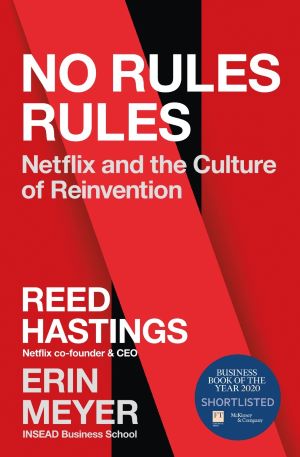No Rules Rules

I just loved it. I was lucky to read it at a good time in my career. Not too early, not too late. The book “No Rules Rules” by Erin Mayer and Reed Hastings is eye-opening. It refined and clarified my opinion about many company processes or cultural aspects.
The book guides the reader through a logical order of so-called “dots” at Netlifx, each supporting the following, connecting the dots. The dots are values, cultural aspects and company policies or lack of policies. For each dot, we can read explanations and reasonings by the company CEO, Reed Hastings, followed by the co-author, Professor Erin Mayer. This duality shows both sides of the topic. How the CEO sees internally and how an external person sees the same thing.
There were many memorable parts for me. I loved how Netflix purposely built up a “high talent density” in creative departments. They don’t aim to employ people life-long; instead, they seek shorter, more productive relationships with their employees. Once this is no longer so productive, they end the employment with a “generous severance package”.
Also very eye-catching was Netflix’s approach to company policies, such as vacation policy, which does not exist. Employees can take as much as they need until they provide great value to the company. The expense policy is only five words: “Act in Netflix’s best interest”. It’s incredible how much the company trusts its employees and supports a free-minded and creative environment.
But there are boundaries at Netflix, too. You cannot go on a vacation all the year or fly on first class all the time. But instead of long, restrictive company policies, they provide context so people can judge what is okay by themselves.
The book continues further with other interesting aspects, such as psychological safety, handling failures, giving and receiving candid feedback, the rockstar principle, etc. Nearly always highlighting the expected manager actions related to the discussed aspects.
One of my favourite terms from the book is “socialising the idea”. I started to use it in development, too. I show my half-baked code to fellow software engineers and give them a chance to comment on my approach before I spend even more time finishing my idea, often resulting in much more elegant solutions.
The book has received high ratings, and for good reason. It is fresh, informative and entertaining. Some ideas are challenging to apply at other companies, but the book’s core idea is influential. Ultimately, the book is an excellent choice for any manager on almost any level.
What I liked the most:
- It gives fresh, great ideas.
- The book is very influential. It forms opinions about company cultures and processes.
- It explains everything properly. It does not leave questions in the reader.
What I didn’t like much:
- Nothing, it is as good as it can be.

Comments